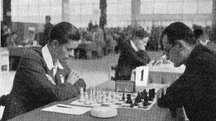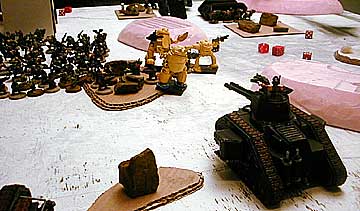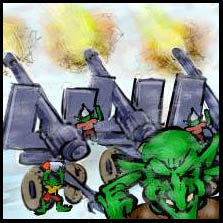
|
If you are unfamiliar with terms like "40K", "Epic", "WFB" "miniatures", or even "RPG", then you may need to be brought up to speed. You may have questions such as: What is wargaming? What's so great about it? Why are these people such fanatics? This article will attempt to serve as an introduction to wargaming for the innocent newbie.
 I suppose if you want to start at the beginning, you'd have to look at early sit-down games like go, mancala, pente, draughts (checkers), etc. These are games of the mind. Leisure activities that exersize the brain; competitive puzzles. A game like chess takes it to a new level, being a bit more of a military simulation than a pure abstraction. The different chess pieces have different characteristics, and can be used in various combinations to achieve the goal. A miniatures wargame takes it a bit further still; less abstration, more simulation. Basically it's like chess but with more rules. The pieces are set up on a tabletop instead of a board.
I suppose if you want to start at the beginning, you'd have to look at early sit-down games like go, mancala, pente, draughts (checkers), etc. These are games of the mind. Leisure activities that exersize the brain; competitive puzzles. A game like chess takes it to a new level, being a bit more of a military simulation than a pure abstraction. The different chess pieces have different characteristics, and can be used in various combinations to achieve the goal. A miniatures wargame takes it a bit further still; less abstration, more simulation. Basically it's like chess but with more rules. The pieces are set up on a tabletop instead of a board.
Instead of kings, queens, bishops, knights, rooks & pawns, you have a variety of unit types, represented by miniatures. Depending on the theme of the game system you are using, these can be spearmen, archers, armoured cavalry, chariots & swordsmen, or perhaps infantry, artillery, armoured personnel carriers & tanks. The unit types will be described in detail in the rules of each game; they will have statistics that represent their abilities within the game - movement, hand-to-hand combat strength, morale, missile combat strength. Most often dice are used to determine outcomes of certain actions.
But the dice rolling is only a part of gameplay; the skill of wargaming is in other areas:
- Preparation: Selection of an army can make the difference between victory and defeat. Building of army lists can be almost as engrossing and satisfying as actually playing the game itself.
- Planning: At the start of the game, objectives are set, and a player must decide how they will be achieved, and how they will foil the other player from achieving theirs. Objectives can be as simple as "take the hill" or more involved such as "evacuate these people from the area".
- Reacting: In the course of a game, as in life, the unexpected will occur. Plans often have to be altered or abandoned in response to new developments. A sharp mind is required to stay focused on your goals and adapt to a fluid situation.
- Decision-making: No action is without risk. A player's task is to weigh the risks of any given opportunity or threat and decide on a course of action. The outcome is never certain, but a decisive player will have better results more often than one who is not.
Most tabletop miniatures wargames are not military simulations in the strictest sense; that is, the focus of the rules systems is on playability rather than on presicion and detail. Die-hard military enthusiasts will find that a certain level of abstraction is present that seems to bend the laws of reality from time to time; Why can't another soldier pick up that weapon? What do you mean that guy wasn't killed by a direct hit from an artillery shell? Where does that vehicle carry all that ammunition?

There are games out there that offer this level of detail, but the pace is much slower and players spend much more time consulting rules books and charts, and less time playing the game. Of course some people enjoy consulting rules books and charts to such an extent that it is as much fun for them as playing the game, but that is a subject for another article.
Another reason for the abstractions is to make the tone of the game more narrative. Usually, these games are based on fantastic worlds rather than history, and the characters and their expoits are intended to be larger-than-life. These are mighty heroes doing great deeds that will be remembered in legends for all time, so we use broad strokes.
 In this aspect lies another area of appeal in miniatures wargaming; storytelling. When selecting and building an army, players are becoming involved in a story, and participating in the telling of it by playing the game. A heroic knight assembles a band of warriors to rescue a remote town from green-skinned orc invaders... the gameplay determines what happens next. This role-playing aspect can be quite satisfying, but again, it is not the main thrust of the rules, and so only a broad level of detail is possible. There are other Role Playing Games, or RPG's that allow players a much more detailed storytelling experience as they play a single character rather than an entire army. Have a look at our journal section to see some of the stories that have come out of the games of RogueBattalion members.
In this aspect lies another area of appeal in miniatures wargaming; storytelling. When selecting and building an army, players are becoming involved in a story, and participating in the telling of it by playing the game. A heroic knight assembles a band of warriors to rescue a remote town from green-skinned orc invaders... the gameplay determines what happens next. This role-playing aspect can be quite satisfying, but again, it is not the main thrust of the rules, and so only a broad level of detail is possible. There are other Role Playing Games, or RPG's that allow players a much more detailed storytelling experience as they play a single character rather than an entire army. Have a look at our journal section to see some of the stories that have come out of the games of RogueBattalion members.
Then there are the miniatures themselves. Whether scratch-built or bought in a store, most players take great satisfaction in collecting and painting the models that make up their army. It takes hours and hours to do even a rudimentary paint job on wargames miniatures, but the satisfaction of assembling a great looking army makes the task worth it. Some players will spend months preparing the figurines in their army, adding other customized bits, or conversions to them. Check out the gallery section to see some of the work of our members.
So that's it, in a nutshell. Miniatures wargaming is not for everyone. It takes a lot of commitment of time and money, and can make a real mess of your house. However, if you like epic themes and games of mental skill then perhaps wargaming is for you. To learn more, have a look at our links section where there are lots of resources available for the novice or the expert, or contact us at rogue@soon.com. Have fun!
Dylan - March 8, 2001
|

 I suppose if you want to start at the beginning, you'd have to look at early sit-down games like go, mancala, pente, draughts (checkers), etc. These are games of the mind. Leisure activities that exersize the brain; competitive puzzles. A game like chess takes it to a new level, being a bit more of a military simulation than a pure abstraction. The different chess pieces have different characteristics, and can be used in various combinations to achieve the goal. A miniatures wargame takes it a bit further still; less abstration, more simulation. Basically it's like chess but with more rules. The pieces are set up on a tabletop instead of a board.
I suppose if you want to start at the beginning, you'd have to look at early sit-down games like go, mancala, pente, draughts (checkers), etc. These are games of the mind. Leisure activities that exersize the brain; competitive puzzles. A game like chess takes it to a new level, being a bit more of a military simulation than a pure abstraction. The different chess pieces have different characteristics, and can be used in various combinations to achieve the goal. A miniatures wargame takes it a bit further still; less abstration, more simulation. Basically it's like chess but with more rules. The pieces are set up on a tabletop instead of a board.

 In this aspect lies another area of appeal in miniatures wargaming; storytelling. When selecting and building an army, players are becoming involved in a story, and participating in the telling of it by playing the game. A heroic knight assembles a band of warriors to rescue a remote town from green-skinned orc invaders... the gameplay determines what happens next. This role-playing aspect can be quite satisfying, but again, it is not the main thrust of the rules, and so only a broad level of detail is possible. There are other Role Playing Games, or RPG's that allow players a much more detailed storytelling experience as they play a single character rather than an entire army. Have a look at our journal section to see some of the stories that have come out of the games of RogueBattalion members.
In this aspect lies another area of appeal in miniatures wargaming; storytelling. When selecting and building an army, players are becoming involved in a story, and participating in the telling of it by playing the game. A heroic knight assembles a band of warriors to rescue a remote town from green-skinned orc invaders... the gameplay determines what happens next. This role-playing aspect can be quite satisfying, but again, it is not the main thrust of the rules, and so only a broad level of detail is possible. There are other Role Playing Games, or RPG's that allow players a much more detailed storytelling experience as they play a single character rather than an entire army. Have a look at our journal section to see some of the stories that have come out of the games of RogueBattalion members.